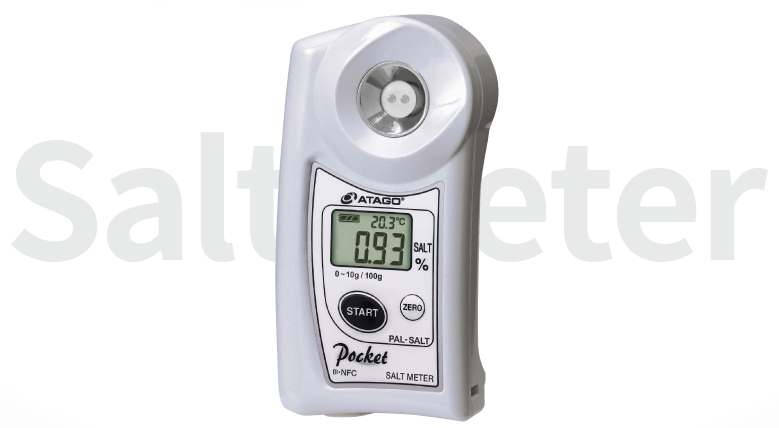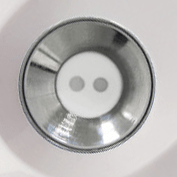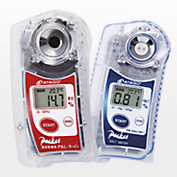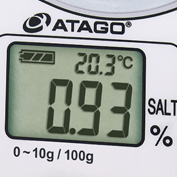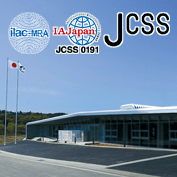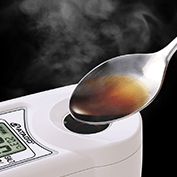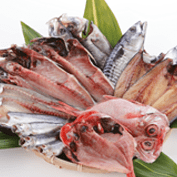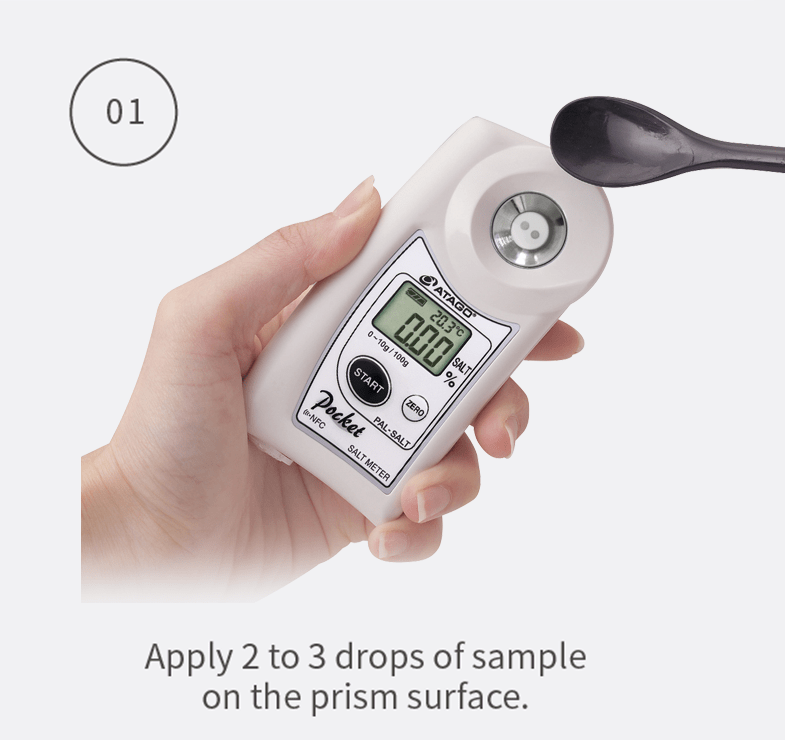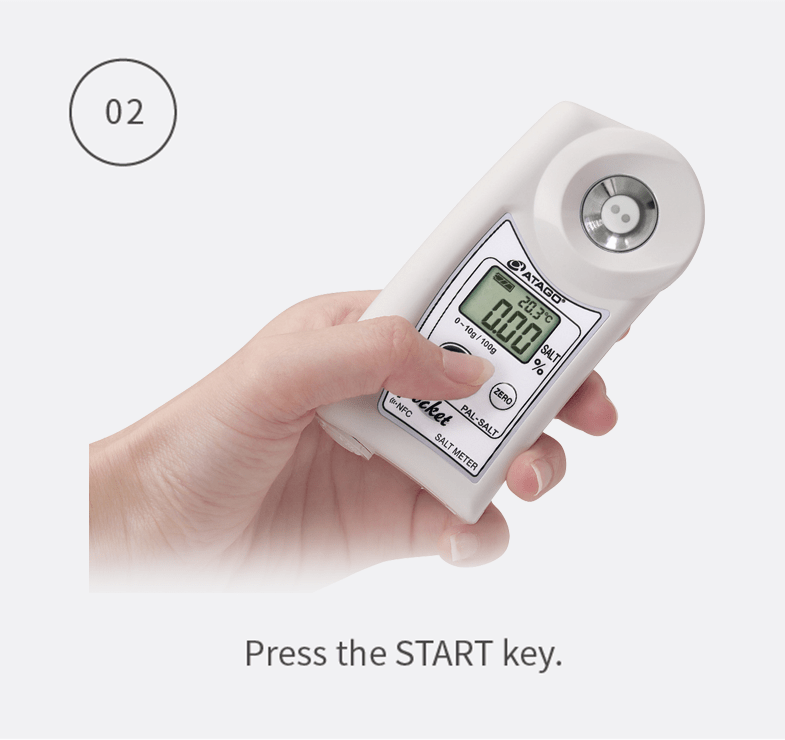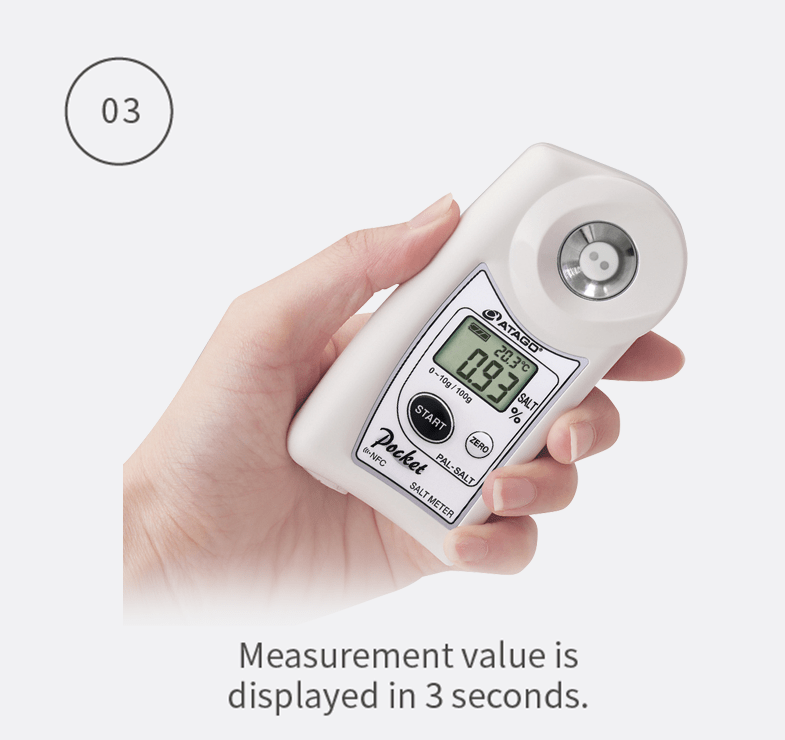Only in the world
Titanium electrode
Longevity and Reliability
![]()
| PAL-SALT is widely used in various industries for food and industrial solutions. For food products, in addition to checking salt content, salt meter is used to make sure salt is properly added and not forgotten for such product as bread, rice balls and frozen. For industrial use, salt meter is widely used for salt resistance test for cars and such. *Offset feature use examples #1. Program a dilution factor to display the original salt% #2. Program a conversion factor to align the readings with titration methods. |
PAL-SALT Mohr gives a reading similar to those obtained from the Mohr’s method (titration). Like other ATAGO salt meters, PAL-SALT Mohr utilizes conductivity to measure samples. This unit also features an offset function which allows for readings to be compensated based on known standards. |
Renewal! New release of PAL-Fish FilletsPAL-FM1 has been renewed and released as a new version, PAL-Fish Fillets - ideal for measuring both dried fish and raw fillets! It is now possible to measure closer to titration values and more precisely with a minimum error of 0.0%*! In addition, by expanding the temperature compensation range to 5 - 40 ゚C, which is more in line with actual environmental site temperatures, measurements have become more stable. Insert the probe into the fillet and in just 3 seconds receive a value that is close to titration. For dried fish, it is recommended to measure in the abdomen area. PAL-Fish Fillets frees the user from the hassle and trouble of past methods!* According to research. Results depend on the type and position of dried fish and raw fillets being measured. |
The PAL-SALT PROBE features convenient operation of submerging the probe in a liquid for measuring the salt content in as fast as 3 seconds. The probe may be inserted directly into semi-solid food. However,measurements at different locations may be inconsistent,and such direct measurements may vary from measurements by dilution methods. ・Electrode pins have extended from 5mm to 10mm for easier measurement. ・Screen now features a backlight for an easier to read |
Technical Specifications
| Model | PAL-SALT | PAL-SALT Mohr | PAL-Fish Fillets | PAL-SALT PROBE |
|---|---|---|---|---|
| Cat.No. | 4250 | 4251 | 4225 | 4222 |
| Scale | Salt concentration (g/100g) Temperature |
Salt concentration (g/100mL) Temperature |
Fish Salinity % Temperature ゚C |
Salt concentration (g/100g) |
| Method | Conductivity method | Conductivity method | Conductivity method | |
| Range | 0.00 to 10.0% (g/100g) | 0.00 to 10.0% (g/100mL) | 0.0 to 10.0% 0.0 to 100 ゚C |
0.00 to 7.0% |
| Resolution | 0.01% for salt concentration of 0.00 to 2.99% 0.1% for salt concentration of 3.0 to 10.0% |
0.01% for salt concentration of 0.00 to 2.99% 0.1% for salt concentration of 3.0 to 10.0% |
0.1% 0.1 C |
0.01% (0.00 to 1.99%) 0.1% (2.0 to 7.0%) |
| Accuracy | Displayed value ±0.05% (for salt concentration of 0.00 to 0.99%) Relative precision ±5% (for salt concentration of 1.00 to 10.0%) |
Displayed value ±0.05% (for salt concentration of 0.00 to 0.99%) Relative precision ±5% (for salt concentration of 1.00 to 10.0%) |
Fish salinity% : Absolute Precision ±0.1%(0.0 to 3.9%) Relative Precision ±5%(4.0 to 10.0%) * In the case of saline solution ±1゚C |
± 0.1% (0.00 to 1.99%) Relative precision : ± 5% (2.1 to 5.0%) Relative precision : ± 10% (5.1 to 7.0%) |
| Dimensions and Weights | Main Unit : 55(W)×31(D)×109(H)mm, 100g Electrode probe : Φ15×570mm (Cable length : applox.400mm) |
9 Reasons - Why ATAGO Salt Meters are Chosen
|
Sturdy Titanium Electrodes. Mere 0.08% Failure Rate.
The world’s first to use durable and sturdy “titanium” electrodes. The use of titanium electrodes conquered typical issues like susceptibility to scratches over a period of time and fluctuating measurement results that are common with gold plated electrodes. |
Completely Water Protected Model No Other Offers
Rated IP 65 water protection. Ready to sustain tough conditions whether in a kitchen or production floor. |
|
Highly Chemical Resistant PBT Body
Highly chemical resistant material, PBT (Polybutylene Terephthalate) is used as a casing material. Unbreakable and sturdy body casing. |
Salinity To A Decimal Point
We have heard many concerned voices with the accuracy of the conventional salt meters that only display rough estimated salt levels and how results may vary depending on how the sample was measured. ATAGO’s salt meter will not just estimate whether it is too salty or not, but rather numerically display the result as a salt concentration. |
|
Accurate Measurement With Calibration Function
The majority of the simplified conventional salt meters do not have calibration function and cannot be calibrated even when measurement values are off. ATAGO’s salt meter can zero set to air and provide calibration service as the JCSS verified manufacturer |
High Temperature Soup Can Be Measured Accurately With Drop Style Pal-SALT
High temperature and oil containing soup dishes such as miso soup, tsuyu for oden (soup sauce for Japanese one-pot dish consisting of several ingredients such as eggs, konjac and processed fishcakes), ramen soup, can be measured with stable readings. The sample temperature can be anywhere from 5 to 100 ℃ (41 to 212 ˚F) . |
|
Solid Samples Such As Ham, Bacon, Or Himono (Dried Fish) Can Be Measured
Solid samples such as ham, bacon, himono, potato chips can be measured by diluting cut or chopped small pieces with water. ATAGO’s salt meter can be used by those with high blood pressure or other lifestyle diseases that would like to record a daily salt consumption measurement. |
Perfectly Compact Size With Portability
A perfectly compact size to be used on a production floor. Its light weight allows to easily take measurement at home or even when dining out for personal health monitoring. |
|
Renewal! New Release Of Pal-Fish Fillets
PAL-FM1 has been renewed and released as a new version, PAL-Fish Fillets - ideal for measuring both dried fish and raw fillets! It is now possible to measure closer to titration values and more precisely with a minimum error of 0.0%*! |
Ease of Measurement
|
|
Function and Design
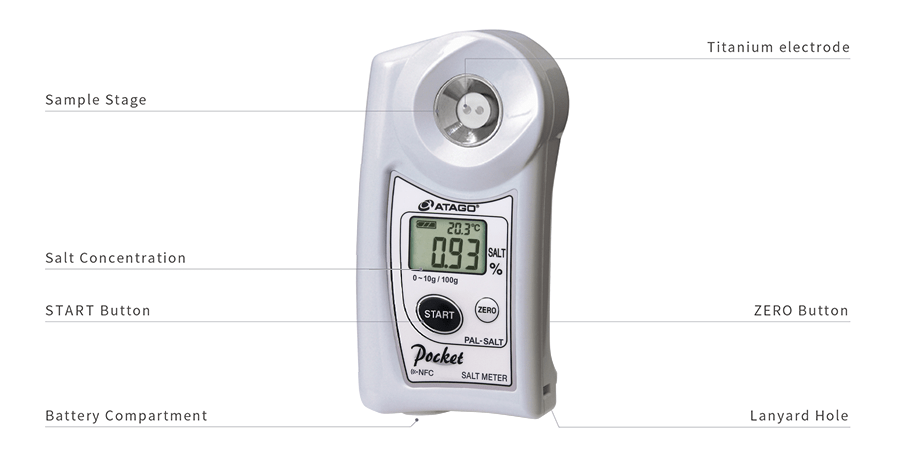
How To Make Dilution
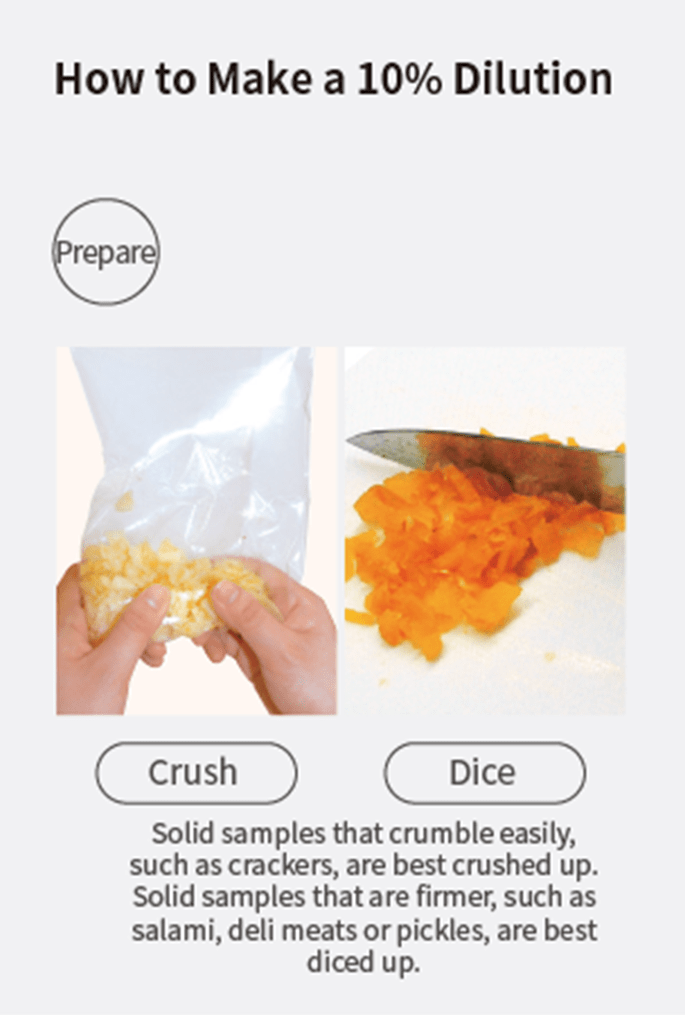 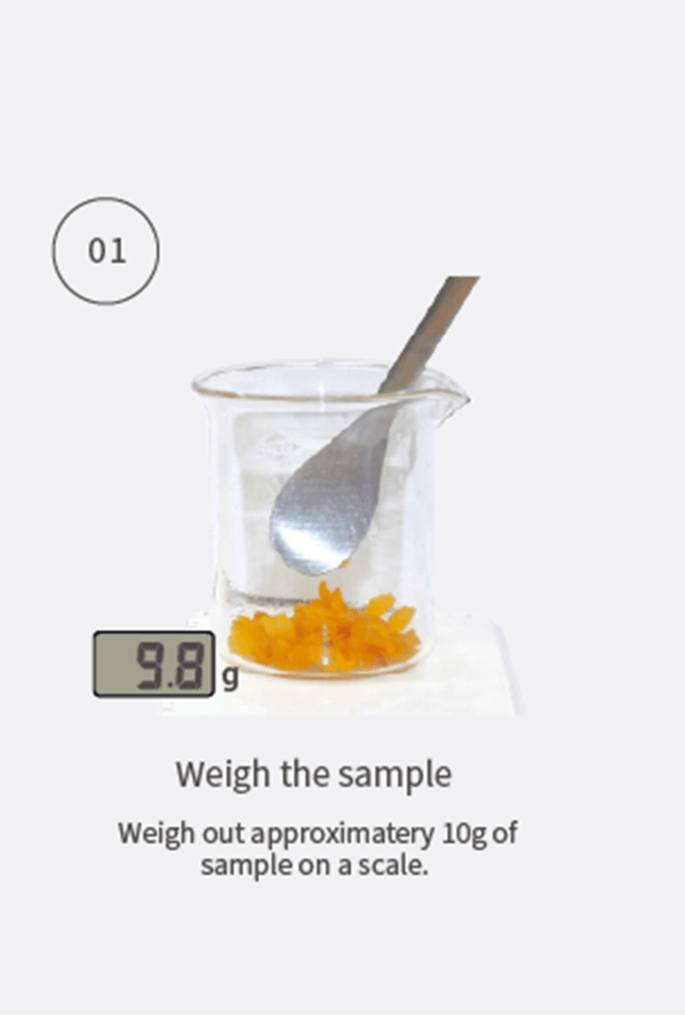 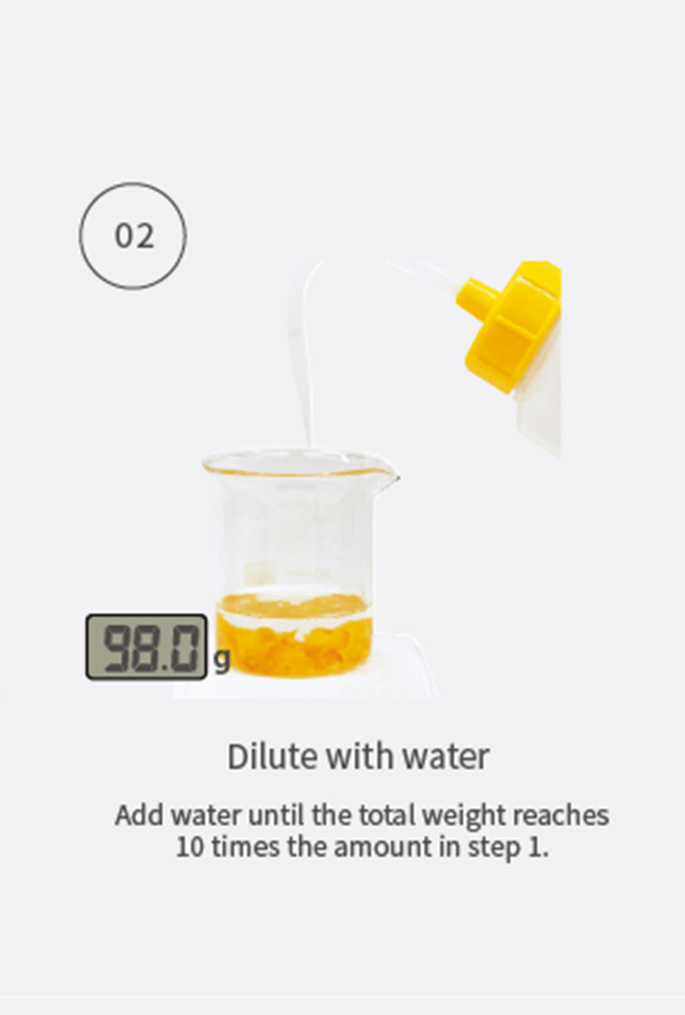 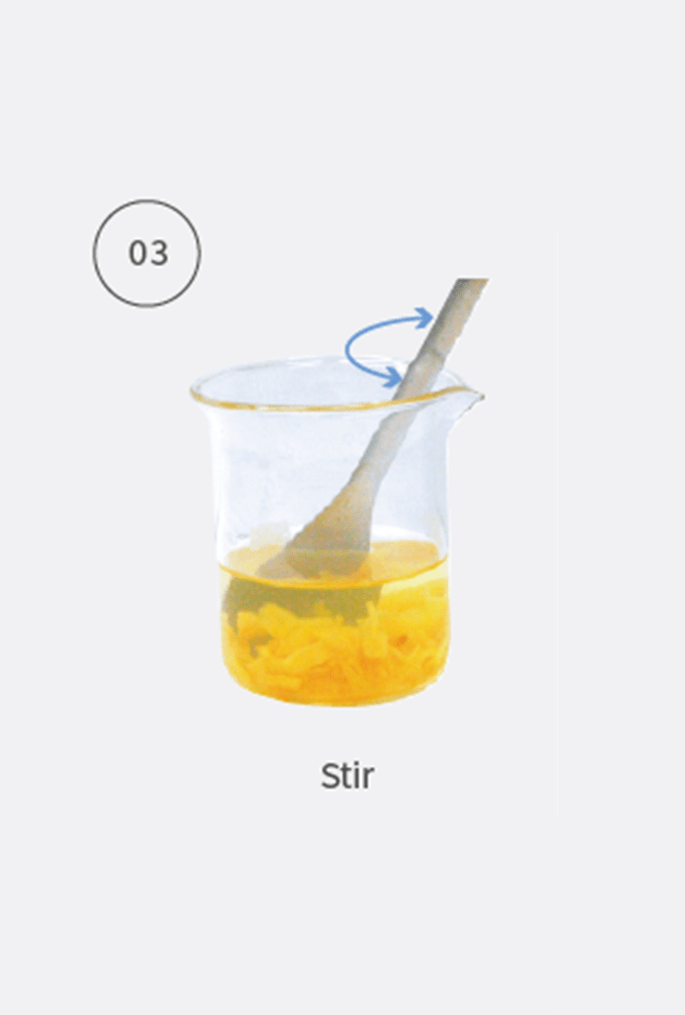 |
Measuring Tips
Thin, drinkable liquids
Thinner or lower concentration liquids, such as soup or miso soup, can be measured by placing a few drops of the sample directly on the sensor.
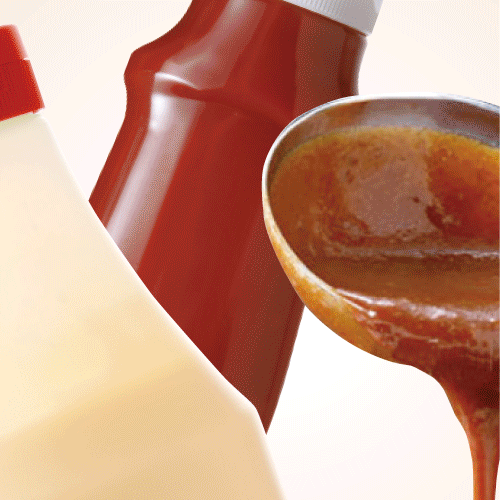
Thick, syrupy or paste-like liquids
Sauces, soup bases, seasonings, gravies and such need to be diluted to 10% for accurate measurement results. Anything that is highly concentrated (anything that measures above 6% Brix with a refractometer), must be diluted. The PAL-SALT and ES-421 measure the conductivity of electrolytes through electrical currents (conductivity). The thicker a solution is, the more closely the molecules are packed, and therefore, the less conductive. This makes the sample more difficult to measure. If not diluted, the measurement values may appear lower than the actual salt content.
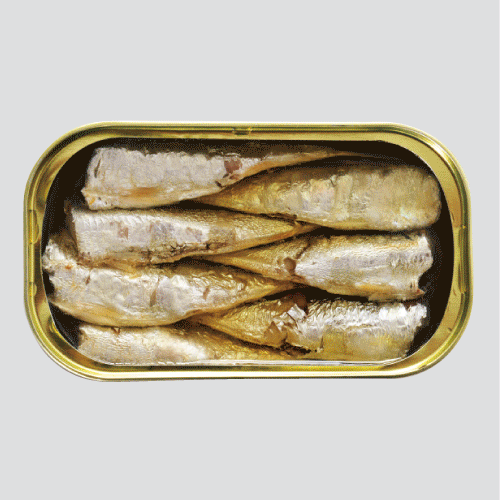
Products with a salt content that exceeds the measurement range (above 10% salt)
Products that contain more than 10% salt, such as pickle brine, need to be diluted. For example, the 10 times dilution of 12% salt brine will measure 1.2%, and the 5 times dilution will measure 2.4%. Adjust the dilution factor so that the salinity falls within the measurement range.
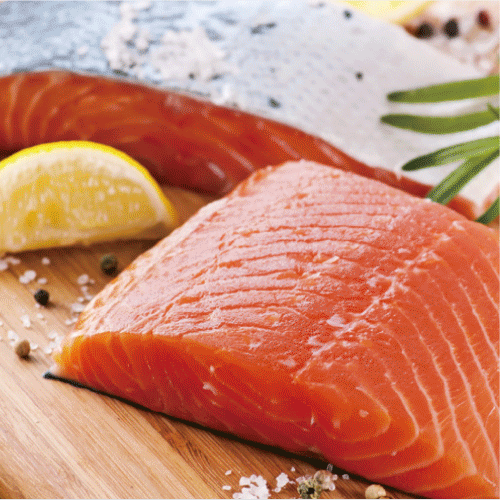
Solid food
Solid foods (ham, bacon, dried foods, and fish) need to be minced, ground, or crushed, diluted with water (1:10 dilution), and mixed thoroughly. As a general guideline, let sit for a few minutes (approx. 3 minutes) to allow the salt to leach out of the food. Depending on the qualities of the sample (whether or not the salt is easily drawn out into the water), the salt concentration of the food, the mincing or crushing method, or how well the sample is mixed with the water, the time needed for the salt to be drawn out into the water will vary. Set a soaking period that works for each product (that allows the salt to be thoroughly drawn out). Measure the salinity of the water and multiply the reading by 10. The PAL-SALT PROBE also has a probe sensor that can be inserted directly into the solid sample for measurement.
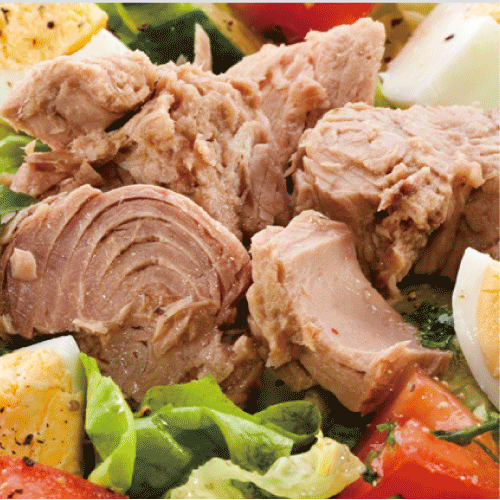
Oily / fatty food
Foods containing oil or fats can also be measured. However, the measurement values of foods that have oil floating on their surface, such as Ramen soup (a Japanese noodle soup), may be unstable. If the readings fluctuate when measuring oily/fatty foods, try stirring the sample, and measure again for more stable readings. When measuring the salinity of oil-packed products, extract the sample from the oil and allow excess oil to drain. Mix 10g of sample with 90g of water to create a 10% dilution. Mix or shake very well and let settle. Residual oil should float to the top of the container. Take a sample from below the oil layer and place on the sensor. Multiply the displayed reading by 10 to obtain the salt concentration of the original sample.
-
Measurement RangeSalt Concentration 0.00 to 10.0% (g/100g)
-
Resolution0.01%
-
Measurement Accuracy±0.05%
-
Measurement Temperature (°C)5 to 100
-
Ambient Temperature (°C)10 to 40
-
UseSalt Concentration
-
International Protection ClassIP65
-
ManufacturerAtago Co Ltd
-
Country of OriginJapan
-
ScaleSalt concentration (g/100mL) and Temperature ゚C, Fish Salinity % and Temperature ゚C, Salt concentration (g/100g), Brix and Salinity
-
MethodConductivity Method, Titration, Not Applicable
-
ModelPAL-SALT, PAL-SALT Mohr, PAL-Fish Fillets, PAL-SALT PROBE, PAL-BX | SALT +5
-
Range0.00 to 7.0%, 0.00 to 10.0% (g/100mL), Not applicable, Brix: 0.0-90.0% and Salinity: 0.00-15.00% (Standard Scale)

























